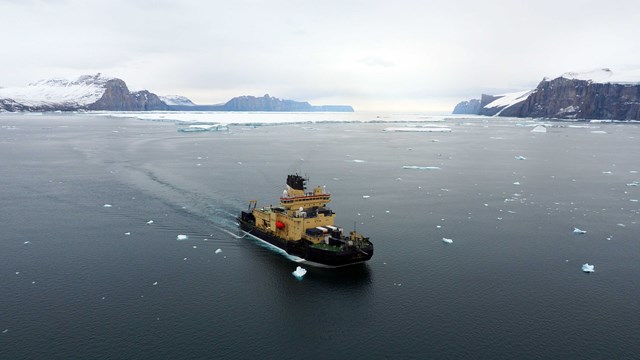Small Arctic organisms of great importance for life on Earth
 Arctic Ocean. Photo: Ida Kinner.
Arctic Ocean. Photo: Ida Kinner.
Bacteria, and other small organisms without a cell nucleus, create conditions for life on our planet and assume art-like forms. This is something that fascinates Johan Wikner, professor of ecology at Umeå University, who is now preparing for the research expedition Synoptic Arctic Survey with the icebreaker Oden.
During the expedition, you are the research leader for the work package Arctic Prokaryotes. Can you explain what it is?
– Prokaryotes mean organisms without a nucleus, in everyday speech called bacteria. Prokaryotes consist of the domains of Bacteria and Archaea in the Tree of Life that describe the relationships between all organisms.
What significance do prokaryotes have for the Arctic ecosystem?
– They degrade organic material and use dissolved compounds that are both organic and inorganic for their growth and energy supply. These compounds include many elements such as carbon, nitrogen, phosphorus, oxygen, sulfur, hydrogen, iron, magnesium. The compounds are converted by various processes into living mass or gases, which determines how those substances, in turn, affect the sea (e.g., food in the marine food web) and the atmosphere (e.g., production of carbon dioxide). The transformation of all these substances on earth is greatly affected by the activity of Prokaryotes.
Why are these organisms interesting to investigate?
– Prokaryotes are the earth's oldest and numerically most abundant organisms. Despite they are small, they have a major influence on the conversion of many elements on earth, including carbon. If we want to understand the carbon cycle, we need to know how prokaryotes transform carbon compounds.
What are the most fun things about investigating organism?
– Organisms behave and do things. It is fascinating how important Prokaryotes are to create the conditions on earth that enable us, humans, to live here today. They also show exciting forms and cell structures that are closer to art than science.
What are you most looking forward to with the expedition?
– To gain better knowledge about how large the living mass of Prokaryotes constitute, how fast they grow, how they breathe and how this varies over large Arctic areas. It is also interesting to study how they cope with long periods with little nutrition and low temperatures. There, the size of the maintenance breathing is an interesting measure in this context. In addition, it will be an exciting experience to see the Arctic Ocean with your own eyes and explore new parts of it.
Anything you want to add?
– The expedition would not be possible without the great experience and expertise that the Swedish Polar Research Secretariat contributes. I would also like to mention the support from my knowledgeable colleagues at Umeå Marine Research Center. My postdoctoral fellow Ashish Verma, Professor Jarone Pinhassi and PhD student Dennis Amnebrink at Linnaeus University are all important members of our project. And of course, the funding from EcoChange and the Kempe Foundation.




